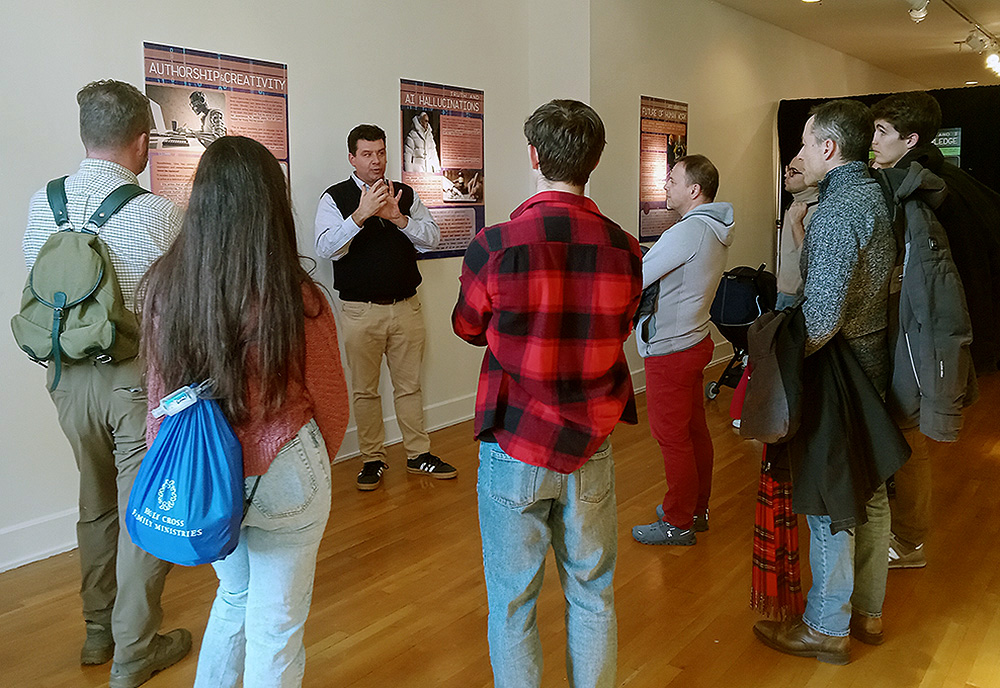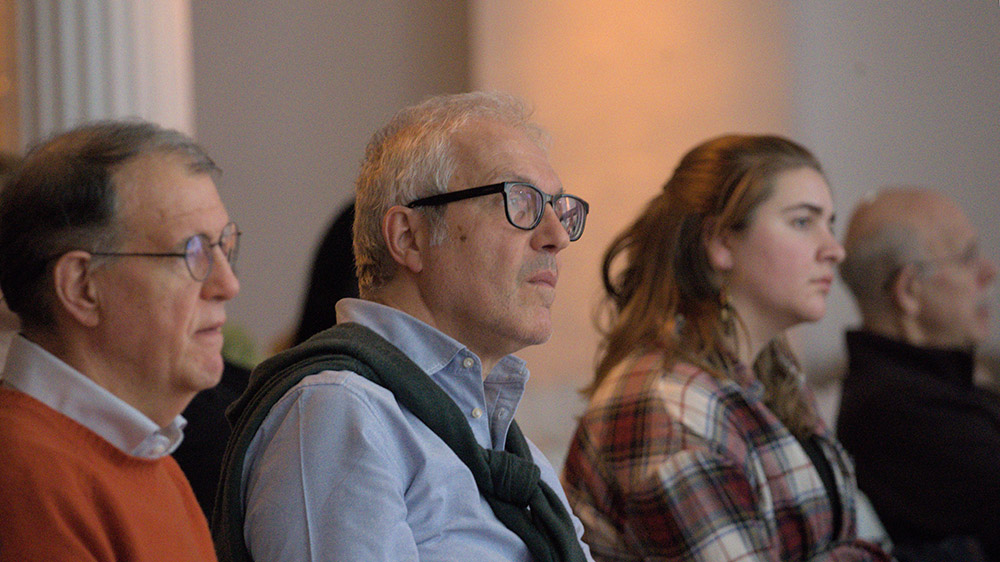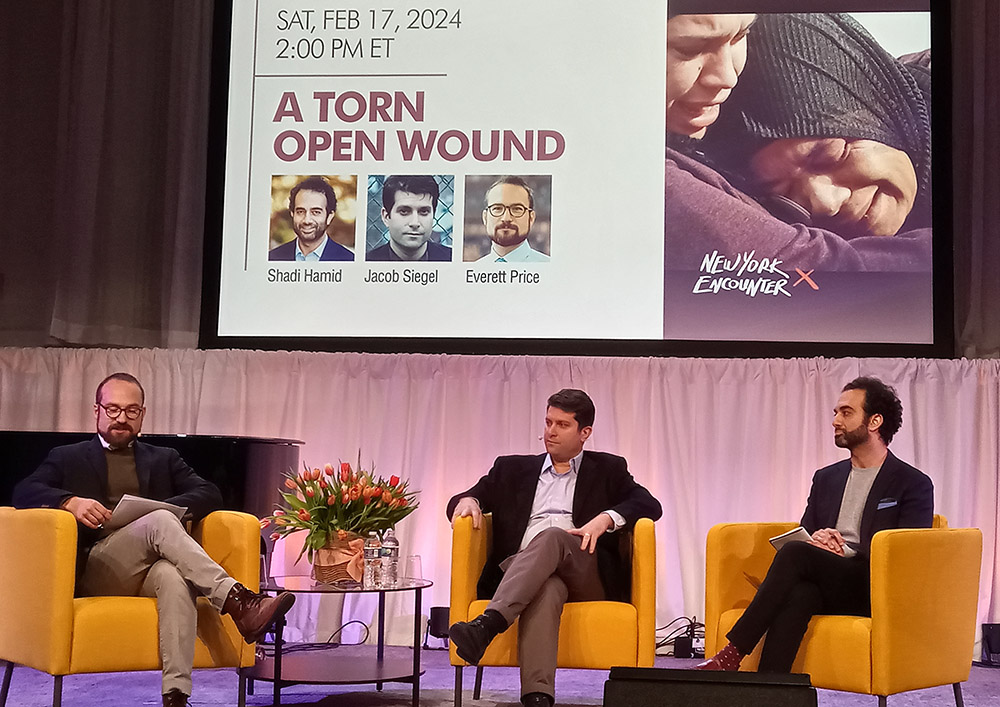
Attendees at the 2024 New York Encounter, a Feb. 16-18 event organized by the Catholic lay movement Communion and Liberation, take a guided tour of one of the exhibitions. (Jeannine Pitas)
A priest from India whose organization works to stop the trafficking of young girls, a high school senior from Washington, D.C., who has started a nonprofit to stop gun violence, a Jerusalem-based journalist covering Christians living in Gaza, and a 2011 Nobel Peace Prize winner were among a diverse lineup of speakers at the 2024 New York Encounter. The three-day series of free lectures, concerts and exhibitions was held Feb. 16-18 in Manhattan.
Drawing thousands of attendees from around the world — including many young adults and families with small children — the Encounter was started 16 years ago by Communion and Liberation, a Catholic movement founded by Fr. Luigi Giussani in 1954. Combining exhibits, performances, and lectures by high-profile speakers — some Catholic, some not — the encounter expresses Giussani's aim of connecting traditional Catholic values with the realities of the modern world.
Each year's event responds to a different theme, such as "Reality Has Never Betrayed Me" or "Crossing the Divide."
This year's theme, "Tearing Open the Sleeping Soul," included discussions on some of the most pressing topics of our time: the rapid development of artificial intelligence, the future of the U.S. Supreme Court, and the ongoing Israel-Hamas war.
It also included a concert of work by Estonian composer Arvo Pärt; a songwriters' competition; and exhibitions on Armenian history, Simone Weil and Leonard Cohen.
'If this were just an event where everyone vigorously agreed with each other, it wouldn't be that interesting.'
—Communion and Liberation member Roland Rosario
"We draw high-profile speakers by daring," Encounter co-founder and president Riro Maniscalco told NCR. "We don't have money to offer them beyond travel expenses and lodging. Eighty-five percent of our budget goes to rentals. The Encounter is run by 400 volunteers who come from all over the U.S. and the world. It's an event of culture and love. Testing everything and retaining what is good."
While the event is grounded in Catholic identity and receives an official blessing from Pope Francis, Maniscalco seeks to make the weekend open to all.
"At the center is the human being. If I start putting out signals, labels and restrictions, I run the risk of losing my own humanity and the beauty of the people who, because of their history and education, are far from the fence I erected. That would be a shame. We learn from Fr. Giussani that there is beauty everywhere. 'Catholic' means universal."
While themes vary from year to year, the focus on transcending divisions remains constant.

Attendees listen during a discussion on "Beyond Left or Right" at the New York Encounter in New York City Feb. 18. (OSV News/Courtesy of New York Encounter/June Ma)
"If this were just an event where everyone vigorously agreed with each other, it wouldn't be that interesting," said Roland Rosario, a Communion and Liberation member who has served the Encounter in various capacities since its inception. "If you're never challenged by anything, you haven't thought too deeply about it. This event is not so much an attempt to find dramatic topics, but to look at the issues that affect us all on a more basic, universal level."
Maniscalco said he is happy that, over the years, both liberal and conservative Catholic media outlets have covered this event.
"If people ask, 'Are you conservative or liberal?', I reply, 'I'm neither. I'm Catholic,' " he said. "The same thing is true of the Encounter — we are not conservative or liberal. That would be too reductive. I'm a father, a husband, a grandfather — a million things, but more than anything else, a poor man searching for friendship with Christ, for justice, for freedom. This is the spirit of the event."
Among the many 2024 sessions, one of the most prominent was "A Torn Open Wound," a dialogue on the ongoing Israel-Hamas war. The session featured Jacob Siegel, a contributing editor at the Jewish-run Tablet magazine, and Washington Post columnist Shadi Hamid. Both said they found the event challenging and rewarding.
"After numerous interviews since Oct. 7, Encounter is the only event that has brought me into dialogue with someone else on the war in Gaza," Siegel said. "In that sense, it is already a success."

From left: Everett Price, a senior policy adviser at the Commission for Security and Cooperation in Europe; Washington Post columnist Shadi Hamid; and Tablet magazine contributing editor Jacob Siegel participate in a Feb. 17 panel at the 2024 New York Encounter. (Jeannine Pitas)
He continued, "What is more significant to me is that we weren't there only, or even primarily, to argue about politics — there is plenty enough 'politics talk' already, much of it shrill and cynical — but to try and talk about the war in a framework of humanistic and ethical concern."
Hamid concurred that while the discussion was at times tense, disagreement is natural.
"We aren't all the same, and we don't all want the same things," he said. "Some divides are indeed irreconcilable. But that shouldn't be taken as a desire for silence but rather as an invitation to actually talk about the nature of our differences, however vast they may be. We can of course also learn about how those on the opposing 'side' understand the conflict, and I don't think it's right or responsible to dismiss the views of those with whom we disagree out of hand."
Hamid said he believes that the Encounter can have a lasting impact toward peace-building. "It's through discussions like this that people are exposed to different perspectives. I can't tell them what to think, but I can tell them what I think, and then they can come to their own conclusions accordingly, weighing the different views that they've heard.
"We live in a democracy. ... In theory, if not always in practice, that means that what we as citizens think and believe can make a difference politically," he said.
Amanda Achtman, a Canadian activist, writer and speaker focused on preventing euthanasia, spoke on a panel titled "A Problem to Be Solved or a Mystery to be Lived?" She said she appreciates the Encounter for its openness.
Advertisement
"The theme for this year was 'Tearing Open the Sleeping Soul,' and I find that conversations about death and dying do just that," she said, mentioning that a Holocaust study trip she took to Germany and Poland at age 18 led her to a lifetime of focusing on big questions.
"In Canada, euthanasia has been legal nationwide for the past several years," she said. "The Encounter seemed an excellent forum to take seriously the experiences of those asking for euthanasia and performing it, to allow ourselves to be shaken by the questions of the suffering and the dying so that we might lead lives that are more existentially awake and morally alert."
Most of the Encounter's 4,000 attendees were Communion and Liberation members from around the U.S. and beyond.
"I love seeing so much joy," said Edgar Alexander Diaz, a regular attendee who first learned about the event through Young Adult Catholics NYC. However, he says that while the Encounter is a celebration, it is sustained by the weekly Schools of Community — small groups that study and discuss Giussani's writings.
Jason, a Washington, D.C.-based intelligence analyst who declined to share his last name due to privacy concerns, was a first-time attendee of the Encounter. While he appreciated the spirit of openness and dialogue, he noted that the event avoided some of the most controversial topics, such as abortion.
"There are places for a non-tense dialogue. But we also need the church to provide spaces for debate and difficult conversations," he said.
Even so, he appreciated Giussani's vision as it was represented at the event. "Fr. Giussani got to the heart of the idea that you can see God in every person, every act. I take this as a challenge to try and see Christ in everything."






